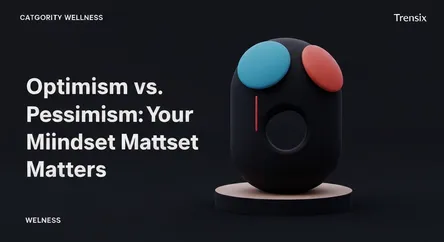Wellness
Optimism vs. Pessimism: Your Mindset Matters

Discover the difference between optimism and pessimism and how your outlook can significantly impact your mental wellness, health, and overall life success.
What is it?
Optimism and pessimism are opposing mindsets that describe how people approach life and its challenges. The classic illustration is a glass of water filled halfway: an optimist sees it as "half full," while a pessimist sees it as "half empty." Optimism is a mental attitude characterized by hope and confidence in a positive future outcome. Pessimism, in contrast, is the tendency to expect the worst possible outcome in any situation. These outlooks represent more than just a mood; they are explanatory styles that shape how we interpret events. Optimists often believe that setbacks are temporary, while pessimists may view them as permanent and pervasive.
Why is it trending?
The discussion around optimism and pessimism is gaining traction within wellness and mindfulness because of the growing emphasis on mental health and resilience. Research consistently links optimism to better mental and physical health, including reduced stress and a lower risk of chronic diseases. In a world facing constant uncertainty, cultivating an optimistic mindset is seen as a crucial tool for coping with adversity and improving life satisfaction. People are increasingly interested in actionable strategies, like mindfulness and gratitude, to shift their perspective from a pessimistic default to a more hopeful and proactive outlook, thereby enhancing their overall well-being.
How does it affect people?
A person's outlook significantly impacts their life. Optimists generally have better health outcomes, with studies showing a lower risk of heart disease and a longer lifespan. They tend to be more resilient, successfully managing stress and bouncing back from setbacks. Conversely, chronic pessimism is linked to higher risks of anxiety, depression, and poor physical health. This mindset can also hinder personal and professional growth, as pessimists may avoid taking risks or pursuing goals because they anticipate failure. Your perspective influences your relationships, career success, and overall happiness.